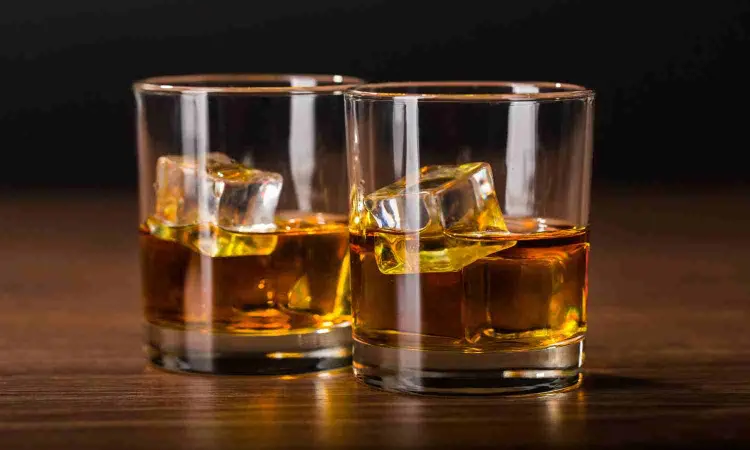- Home
- Medical news & Guidelines
- Anesthesiology
- Cardiology and CTVS
- Critical Care
- Dentistry
- Dermatology
- Diabetes and Endocrinology
- ENT
- Gastroenterology
- Medicine
- Nephrology
- Neurology
- Obstretics-Gynaecology
- Oncology
- Ophthalmology
- Orthopaedics
- Pediatrics-Neonatology
- Psychiatry
- Pulmonology
- Radiology
- Surgery
- Urology
- Laboratory Medicine
- Diet
- Nursing
- Paramedical
- Physiotherapy
- Health news
- Fact Check
- Bone Health Fact Check
- Brain Health Fact Check
- Cancer Related Fact Check
- Child Care Fact Check
- Dental and oral health fact check
- Diabetes and metabolic health fact check
- Diet and Nutrition Fact Check
- Eye and ENT Care Fact Check
- Fitness fact check
- Gut health fact check
- Heart health fact check
- Kidney health fact check
- Medical education fact check
- Men's health fact check
- Respiratory fact check
- Skin and hair care fact check
- Vaccine and Immunization fact check
- Women's health fact check
- AYUSH
- State News
- Andaman and Nicobar Islands
- Andhra Pradesh
- Arunachal Pradesh
- Assam
- Bihar
- Chandigarh
- Chattisgarh
- Dadra and Nagar Haveli
- Daman and Diu
- Delhi
- Goa
- Gujarat
- Haryana
- Himachal Pradesh
- Jammu & Kashmir
- Jharkhand
- Karnataka
- Kerala
- Ladakh
- Lakshadweep
- Madhya Pradesh
- Maharashtra
- Manipur
- Meghalaya
- Mizoram
- Nagaland
- Odisha
- Puducherry
- Punjab
- Rajasthan
- Sikkim
- Tamil Nadu
- Telangana
- Tripura
- Uttar Pradesh
- Uttrakhand
- West Bengal
- Medical Education
- Industry
Binge drinking associated with increased heart rate and atrial tachycardias: EHJ

A recent study published in the European Heart Journal unveiled increase in heart rate and atrial tachycardias with binge drinking in which young individuals through continuous rhythm monitoring. The holiday heart syndrome is characterized by cardiac arrhythmias such as atrial fibrillation, may be brought on by an acutely high alcohol intake. Stefan Brunner and colleagues set out this study to prospectively examine the temporal course of cardiac arrhythmias that arise after binge drinking in young individuals due to a lack of underlying data.
202 volunteers in total were enlisted who planned to consume alcohol acutely and had predicted peak breath alcohol concentrations (BAC) of ≥1.2 g/kg. Electrocardiogram (ECG) monitoring for 48 hours was used in the study. Baseline (hour 0), the "drinking period" (hours 1–5), the "recovery period" (hours 6–19), and two control periods, which corresponded to the 24 hours after the "drinking" and "recovery periods," respectively, were covered. BAC readings were used to track acute alcohol consumption during the "drinking period." Heart rate variability (HRV), atrial tachycardia, premature ventricular complexes (PVC), premature atrial complexes (PAC) and mean heart rates were examined on ECGs.
The data showed that when alcohol consumption increased, there was an excess of atrial tachycardias and an increase in heart rate. An autonomic modulation with sympathetic activation after alcohol consumption and the ensuing "recovery period" was revealed by HRV measurement, with parasympathetic predominance following. While PVCs were more common during the "drinking period," PACs were substantially more common during the "control periods." During the 'recovery phase', 10 individuals had significant arrhythmic events, mostly atrial fibrillation and ventricular tachycardias.
Premature ventricular complexes were more common in individuals without a known history of cardiac arrhythmias during the hours of alcohol use. About 1 day later, premature atrial complexes were much more common. Also, approximately 200 subjects had significant arrhythmic events during the hours after their binge drinking, including atrial fibrillation, non-sustained ventricular tachycardias, and varying degrees of atrioventricular block.
Overall, this study highlighted the holiday heart syndrome as a health concern by showing how excessive drinking affects heart rate changes and increases atrial tachycardias during the "drinking period" and the emergence of clinically significant arrhythmias following the "recovery period."
Reference:
Brunner, S., Krewitz, C., Winter, R., von Falkenhausen, A. S., Kern, A., Brunner, D., & Sinner, M. F. (2024). Acute Alcohol Consumption and Arrhythmias in Young Adults: The MunichBREW II Study. In European Heart Journal. Oxford University Press (OUP). https://doi.org/10.1093/eurheartj/ehae695
Neuroscience Masters graduate
Jacinthlyn Sylvia, a Neuroscience Master's graduate from Chennai has worked extensively in deciphering the neurobiology of cognition and motor control in aging. She also has spread-out exposure to Neurosurgery from her Bachelor’s. She is currently involved in active Neuro-Oncology research. She is an upcoming neuroscientist with a fiery passion for writing. Her news cover at Medical Dialogues feature recent discoveries and updates from the healthcare and biomedical research fields. She can be reached at editorial@medicaldialogues.in
Dr Kamal Kant Kohli-MBBS, DTCD- a chest specialist with more than 30 years of practice and a flair for writing clinical articles, Dr Kamal Kant Kohli joined Medical Dialogues as a Chief Editor of Medical News. Besides writing articles, as an editor, he proofreads and verifies all the medical content published on Medical Dialogues including those coming from journals, studies,medical conferences,guidelines etc. Email: drkohli@medicaldialogues.in. Contact no. 011-43720751


